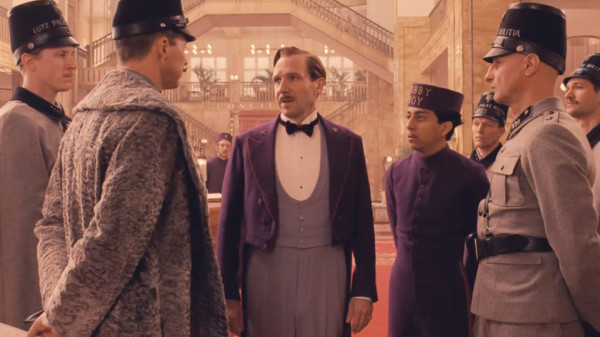 After eight films in fifteen years everyone knows by now what to expect from Wes Anderson in terms of manner, mirth and sentiment. And while his style hasn’t evolved much, Anderson’s cracked character fables are always suitably fractured and colourful excursions. If anything, his tales are becoming more detached from reality yet seem to flourish in their skewered, clandestine fantasy lands.
After eight films in fifteen years everyone knows by now what to expect from Wes Anderson in terms of manner, mirth and sentiment. And while his style hasn’t evolved much, Anderson’s cracked character fables are always suitably fractured and colourful excursions. If anything, his tales are becoming more detached from reality yet seem to flourish in their skewered, clandestine fantasy lands.
For his latest, Anderson conjures the pastel-tinted Republic of Zubrowka and gathers another starry ensemble of familiar names and new faces, but it is the characters they play that are more memorable. While remaining kooky staples of the Anderson picture, rich with dazzling complexities, his concept, setting and narrative are also remarkably fresh.
Ralph Fiennes is M. Gustave, a debonair concierge of the Overlook-like hotel of the title who prides himself as a connoisseur of everything Grand Budapest. Gustave becomes the unexpected beneficiary of a priceless painting left to him by a recently departed occupant (Tilda Swinton) with whom he was entangled. After discovering she was murdered Gustave is singled out as prime suspect, so steals the painting and goes on the run from the police and the dead madam’s psychotic siblings.
The tale unravels with multiple, time-bending curves and character twists, evoking the feel of a jovial, 60s crime caper. Fiennes is divine, channelling the kook of Niven and Havers, while Jeff Goldblum, Willem Dafoe and Adrien Brody, amongst others, offer excellent support delivering wry dialogue with relish.
Even though most of his work is ambitious in its juggling of fables, The Grand Budapest Hotel feels even more epic with mountainous locations and exhilarating chase sequences, yet retains the quirks of a low-budget indie by its use of artsy, cut and paste animation and dinky models. And it is in its design that The Grand Budapest Hotel prevails.
Some sections are fleeting with too many characters and both prologue and epilogue feel a smidge nailed on but The Grand Budapest Hotel remains a fun-filled caper with slapstick action. Bursting with fun, the film is surprisingly high octane and fitting to the big screen while remaining one of the most vibrant ventures of Anderson’s career, and by far his best work since The Royal Tenenbaums (2001).
Daniel has awarded The Grand Budapest Hotel four Torches of Truth
















{ 0 comments… add one now }